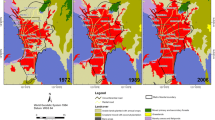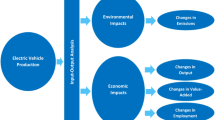Abstract
This study developed a method to determine the optimum supply of shared cars according to personal travel behaviors in the condition of minimum energy consumption. We applied the method in Southern Higher Education Zone (SHEZ) of Ningbo based on the survey data of personal travel behaviors in the region. Solutions in the case of minimum energy consumption encourage more shared-car trips, less private-car trips, and mass-transit trips. Total of 111 kJ of energy could be saved by each student from the actual case to minimum energy case. In SHEZ, 76 shared cars are recommended to provide an optimal supply of shared cars compared to 87 shared cars in reality. According to the findings, two policy implications are put forward from the aspects of supply and demand. First, to make an efficient supply, companies should focus on the distribution of shared cars according to the temporal and spatial distribution of usage, rather than only number of vehicles. Meanwhile, it is important to increase the usage of shared cars through policies, such as campaigns that raise residents’ awareness of car sharing as a green, flexible, and all-distance travel option for both workdays and holidays, and countermeasures that promote the usage of shared cars by key groups such as non-car owners. This study not only provides a method to estimate the optimum supply from viewpoint of minimum energy consumption, but also provide policy implications to guide the behaviors of both companies and users to improve the efficient usage of shared cars in Ningbo real case.


Similar content being viewed by others
References
Amatuni, L., Ottelin, J., Steubing, B., & Mogollón, J. M. (2020). Does car sharing reduce greenhouse gas emissions? Assessing the modal shift and lifetime shift rebound effects from a life cycle perspective. Journal of Cleaner Production, 2661, 121869.
Auto Sina. (2019). Passenger cars per 1000 capita in main countries by World Bank. http://auto.sina.com.cn/news/zz/2019-08-09/detail-ihytcerm9538156.shtml. Accessed 9 Aug 2019.
Boyacı, B., Zografos, K. G., & Geroliminis, N. (2015). An optimization framework for the development of efficient one-way car-sharing systems. European Journal of Operational Research, 240(3), 718–733.
Brandstätter, G., Kahr, M., & Leitner, M. (2017). Determining optimal locations for charging stations of electric car-sharing systems under stochastic demand. Transportation Research Part B: Methodological, 104, 17–35.
Cai, H., Wang, X., Adriaens, P., & Xu, M. (2019). Environmental benefits of taxi ride sharing in Beijing. Energy, 174, 503–508.
Carrese, S., Andreagiovanni, F., & Giacchetti, T. (2020). Antonella Nardin, Leonardo Zamberlan. An optimization model for renting public parking slots to carsharing services. Transportation Research Procedia, 452020, 499–506.
China Auto Rent. (2018). 2007–2017 Big Data Report on China's Automobile Rental Consumption. http://www.askci.com/news/chanye/20180127/160123117079.shtml#. Accessed 27 Jan 2018.
China News. (2018). Shanghai license plate “last shot of the year”: The winning rate is 7.8%, which is the highest in the whole year, December, 2018. http://www.chinanews.com/auto/2018/12-15/8703085.shtml. Accessed 15 Dec 2018.
China Industry Information. (2019). Analysis on the development scale, market share, user group proportion and development trend of China's shared vehicles in 2019. http://www.chyxx.com/industry/201912/814520.html. Accessed 6 Dec 2019.
Deza, A., Huang, K., & Metel, M. R. (2020). Charging station optimization for balanced electric car sharing. Discrete Applied Mathematics. https://doi.org/10.1016/j.dam.2020.01.042.
Firnkorn, J., & Müller, M. (2011). What will be the environmental effects of new free-floating car-sharing systems? The case of car2go in Ulm. Ecological Economics, 70(815), 1519–1528.
Gambella, C., Malaguti, E., Masini, F., & Vigo, D. (2018). Optimizing relocation operations in electric car-sharing. Omega, 18, 234–245.
Hua, Y., Zhao, D., Wang, X., & Li, X. (2019). Joint infrastructure planning and fleet management for one-way electric car sharing under time-varying uncertain demand. Transportation Research Part B: Methodological, 128, 185–206.
Ikezoe, K., Kiriyama, E., & Fujimura, S. (2020). Car-sharing intention analysis in Japan by comparing the utility of car ownership for car-owners and non-car owners. Transport Policy, 96, 1–14.
Japanese Road Bureau. (2006). Ministry of Land, Infrastructure and Transport. The method of calculating time value and running fare unit. http://www.mlit.go.jp/road/ir/iinkai/1pdf/s1–56.pdf/. Accessed 2 Apr 2006.
Lai, K., Chen, T., & Natarajan, B. (2020). Optimal scheduling of electric vehicles car-sharing service with multi-temporal and multi-task operation. Energy, 204, 117929.
Lemme, R. F. F., Arruda, E. F., & Bahiense, L. (2019). Optimization model to assess electric vehicles as an alternative for fleet composition in station-based car sharing systems. Transportation Research Part D: Transport and Environment, 67, 173–196.
Lin, M., Huang, C., & Xu, Z. (2020). MULTIMOORA based MCDM model for site selection of car sharing station under picture fuzzy environment. Sustainable Cities and Society, 53, 101873.
Litman, T. (2000). Evaluating carsharing benefits. Transport Research Record, 1702, 31–35.
Mattia, G., Mugion, R. G., & Principato, L. (2019). Shared mobility as a driver for sustainable consumptions: The intention to re-use free-floating car sharing. Journal of Cleaner Production, 23710, 117404.
Martin, E., & Shaheen, S. (2011). The impact of carsharing on public transit and non-motorized travel: An exploration of north american carsharing survey data. Energies, 4(11), 2094–2114.
Ministry of Transport of People′s Republic of China. (2018). Statistic report of transportation in 2018. http://xxgk.mot.gov.cn/jigou/zhghs/201904/t20190412_3186720.html. Accessed 12 Apr 2019.
Ministry of Transport of People's Republic of China. (2019). Statistic report of transportation in center cities in January of 2019. http://xxgk.mot.gov.cn/jigou/zhghs/201902/t20190220_3167873.html. Accessed 20 Feb 2019.
Miao, H., Jia, H., Li, J., & Qiu, T. Z. (2019). Autonomous connected electric vehicle (ACEV)-based car-sharing system modeling and optimal planning: A unified two-stage multi-objective optimization methodology. Energy, 169, 797–818.
Mounce, R., & Nelson, J. D. (2019). On the potential for one-way electric vehicle car-sharing in future mobility systems. Transportation Research Part A: Policy and Practice, 120, 17–30.
National Bureau of Statistics. (2019). National data of private vechile registration, http://data.stats.gov.cn/search.htm?s=%E7%A7%81%E4%BA%BA%E6%B1%BD%E8%BD%A6%E4%BF%9D%E6%9C%89%E9%87%8F. Accessed 1 Jan 2020.
Ningbo chengshi yongpai client. (2015). Ningbo Minsheng e-point communication Message board. http://nb8185.cnnb.com.cn/tiezi/minsheng_view_mobile.php?aid=750737. Accessed 30 Dec 2015.
Ningbo China Network. (2017). Didi releases big data on travel in key cities in China: Ningbo is the easiest place to take a taxi, http://zjnews.zjol.com.cn/zjnews/nbnews/201710/t20171019_5396703.shtml. Accessed 19 Oct 2017.
Ningbo Municipal Statistics Bureau. (2017). Statistics Bulletin of National Economy and Social Development of Ningbo, http://vod.ningbo.gov.cn:88/nbtjj/tjnj/2018nbnj/zk/html/gbe.pdf. Accessed 6 Feb 2018.
Ningbo Municipal Statistics Bureau. (2019). Ningbo national economic and social development statistical bulletin. http://tjj.ningbo.gov.cn/art/2019/2/2/art_18617_3583429.html. Accessed 2 Feb 2019.
Onat N.C., Kucukvar M., Tatari O., Zheng Q.P. (2016) Combined application of multi-criteria optimization and life-cycle sustainability assessment for optimal distribution of alternative passenger cars in U.S. Journal of Cleaner Production,112(120 ):291–307.
Petrillo, A., Carotenuto, P., Baffo, I., & Felice, F. D. (2018). A web-based multiple criteria decision support system for evaluation analysis of carpooling. Environment, Development and Sustainability, 20, 2321–2341.
Schulte, F., & Voß, S. (2015). Decision Support for Environmental-friendly Vehicle Relocations in Free- Floating Car Sharing Systems: The Case of Car2go. Procedia CIRP, 30, 275–280.
Schmidt, P. (2020). The effect of car sharing on car sales. International Journal of Industrial Organization, 71, 102622.
Sohu News. (2018). New energy vehicles account for 1.37% of the total vehicle. https://www.sohu.com/a/324908473_377286. Accessed 4 July 2019.
Sohu News. 2019. An survey on the consumption of shared cars in China in 2019. https://www.sohu.com/a/318436147_489617. Accessed 11 June 2019.
Stigler, G. (1950). The development of utility theory: Part 1 and 2. Journal of Political Economy, 58, 307–327.
World Resources Institute. (2017). China′s Clean Air Challenge: $3 Billion Air Pollution from Transport in Chengdu. https://www.wri.org/blog/2017/05/chinas-clean-air-challenge-3-billion-air-pollution-transport-chengdu. Accessed 31 May 2017.
Yin, Y., Mizokami, S., & Aikawa, K. (2015). Compact development and energy consumption: Scenario analysis of urban structures based on behavior simulation. Applied Energy, 159, 449–457.
Yin, B., Liu, L., Coulombel, N., & ViguiéV. . (2018). Appraising the environmental benefits of ride-sharing: The Paris region case study. Journal of Cleaner Production, 17710(888), 898.
Zhang, D., Liu, Y., & He, S. (2019). Vehicle assignment and relays for one-way electric car-sharing systems. Transportation Research Part B: Methodological, 120, 125–146.
Zheng, Z., & Chen, Z. (2019). Discussion on measures to reduce the electricity charge of rail transit. Electrical Engineering, 6, 99–103. ((in Chinese)).
Zhou, F., Zheng, Z., Whitehead, J., Perrons, R. K., Washington, S., & Page, L. (2020). Examining the impact of car-sharing on private vehicle ownership. Transportation Research Part A: Policy and Practice, 138, 322–341.
Acknowledgements
The work described in this paper was also supported by Natural Science Foundation of Zhejiang Province, China (Grant No. Q19D010012). This work was supported by the K.C. Wong Magna Fund in Ningbo University.
Author information
Authors and Affiliations
Corresponding author
Ethics declarations
Conflict of interest
The authors declare that they have no known competing financial interests or personal relationships that could have appeared to influence the work reported in this paper.
Additional information
Publisher's Note
Springer Nature remains neutral with regard to jurisdictional claims in published maps and institutional affiliations.
Rights and permissions
About this article
Cite this article
Yin, Y., Wang, H., Xiong, J. et al. Estimation of optimum supply of shared cars based on personal travel behaviors in condition of minimum energy consumption. Environ Dev Sustain 23, 13324–13339 (2021). https://doi.org/10.1007/s10668-020-01213-y
Received:
Accepted:
Published:
Issue Date:
DOI: https://doi.org/10.1007/s10668-020-01213-y




